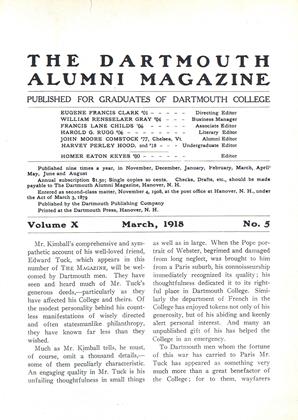CHARLES DOWNER HAZEN '89. Henry Holt & Co., N. Y.
In Alsace-Lorraine Under GermanRule Charles Downer Hazen '89, has produced one of the notable war books. If there are Americans who were surprised that President Wilson in outlining American peace terms included the demand that "the wrong done to France by Prussia in 1871 in the matter of Alsace-Lorraine, which has unsettled the peace of the world for nearly fifty years, should be righted," Professor Hazen's book, which was published several weeks before President Wilson's address to Congress, will make the justice and necessity of that demand abundantly plain.
One of the strongest and most serviceable features of the book is its explanation of the process by which France got Alsace-Lorraine and made it French, since there has been much misconception on the point and many otherwise well informed persons have been under the impression that the forcible annexation of Alsace-Lorraine by Germany in 1871 was simply a belated reparation for an old injury against Germany committed by France. Without in the least seeking to excuse the selfish aims of Richelieu and Louis XIV Professor Hazen shows conclusively that in the acquisition of Alsace-Lorraine by France there was no such outrage against German nationality as was committed by Germany against nationality in 1871. Despite its German speech and German blood the bond which connected Alsace-Lorraine with seventeenth century Germany was very feeble. Moreover, Germany of that day lacked the essential attributes of nationality. While much might be said against the taking of Alsace-Lorraine by France from the standpoint of the inhabitants of those provinces there was in the act no grievous injury to German nationality. But the people of Alsace-Lorraine, if they ever seriously objected to the change, were soon reconciled by the conciliatory policy of France. The little that was still needful to make them completely French was supplied by the French Revolution. From that great transformation Alsace-Lorraine emerged in mind and heart as thoroughly French as Paris itself.
Professor Hazen analyzes acutely the excuses put forward by Germany in 1871 to justify its taking of AlsaceLorraine. The real reason was military advantage. Doubtless the Germans were sincere in their belief that the Alsatians would soon become good Germans. That the belief was unwarranted and that the Germans were either unable or unwilling to pursue a policy toward Alsace-Lorraine which would bring about that result Professor Hazen proves by abundant evidence. In his skillful hands the hideousness of German rule in Alsace-Lorraine since 1871 is portrayed in its true colors. The hollow pretence of concession in the Alsatian constitution of 1911 is exposed. The Zabern affair of 1913, as an evidence of the failure of German rule in Alsace-Lorraine and as a crisis in the struggle between liberty and despotism in the German Empire, gets from Professor Hazen a treatment worthy of its great interest and significance. The book closes with an eloquent and moving appeal for the return of Alsace-Lorraine to France as an act of justice to the Alsatians and to France and as an indispensable feature of an enduring peace.
Some scholars for whom the alpha and omega of scholarship is restrained expression, a certain judicial pose which forbids any expression of personal sympathies, will probably be offended by the general tone of the "book and especially by some of the terms which Professor Hazen employs to characterize the methods of Germany. Still others may wish that milder terms had been employed, for fear that the argument may lose some of its force by creating a suspicion of undue partisanship. For myself I rejoice that the book is just as it has been written. It is the truth about Alsace-Lorraine. Anything less severe in its condemnation of German rule there would have failed to make plain why the wrong done in 1871 must be righted by the return of Alsace-Lorraine to France. Dartmouth men may well take pride in the fact that one of their number in this book and in his remarkably penetrating analysis of the real character of the German government, recently published in pamphlet form by the Committee on Public Information, has contributed powerful support to establish the justice of our cause in the great conflict against the evil forces of Germany.
 View Full Issue
View Full Issue
More From This Issue
-
 Article
ArticleCOLLEGE NEWS
March 1918 -
 Article
ArticleEDWARD TUCK '62
March 1918 By Benjamin A. Kimball '54 -
 Article
ArticleMr. Kimball's comprehensive and sympathetic account of his well-loved friend,
March 1918 -
 Sports
SportsBASEBALL
March 1918 -
 Class Notes
Class NotesCLASS SECRETARIES
March 1918 -
 Article
ArticleTHE ORDNANCE TRAINING SCHOOL
March 1918 By W. R. Gray, '04
FRANK MALOY ANDERSON
-
 Books
BooksGUERNSEY CENTER MOORE FOUNDATION LECTURES
April, 1923 By FRANK MALOY ANDERSON -
 Books
BooksTHE FRENCH REVOLUTION
February 1933 By Frank Maloy Anderson -
 Books
BooksSINCE THE CIVIL WAR
May 1936 By Frank Maloy Anderson -
 Article
ArticleMr. Anderson's List
November 1939 By Frank Maloy Anderson -
 Books
BooksFRANCE 1940-1942, A COLLECTION OF DOCUMENTS AND BIBLIOGRAPHY.
November 1942 By Frank Maloy Anderson -
 Books
BooksFACULTY PUBLICATIONS
November, 1025 By Franklin Mcduffee, Frank Maloy Anderson
Books
-
 Books
BooksRobert S. Monahan '29
January, 1931 -
 Books
BooksBriefly Noted
NOVEMBER 1965 -
 Books
BooksTHE MAN WHO LIVES IN PARADISE.
May 1955 By CLIFF JORDAN '45 -
 Books
BooksALUMNI PUBLICATIONS
August, 1925 By James F. Colby, H. D. Foster -
 Books
BooksALBERT INSKIP DICKERSON: SELECTED WRITINGS
November 1974 By JAMES L. FARLEY '42 -
 Books
BooksSCENERY FOR THE THEATRE: THE ORGANIZATION, PROCESSES, MATERIALS AND TECHNIQUES USED TO SET THE STAGE.
MAY 1972 By JOHN FINCH


